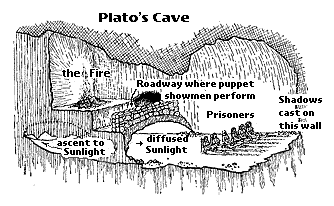

Socrates & Glaucon:
And now, I said, let me show in a figure how far our nature is enlightened or unenlightened: - Behold! Human beings living in a underground den, which has a mouth open towards the light and reaching all along the den; here they have been from their childhood, and have their legs and necks chained so that they cannot move, and can only see before them, being prevented by the chains from turning round their heads. Above and behind them a fire is blazing at a distance, and between the fire and the prisoners there is a raised way; and you will see, if you look, a low wall built along the way, like the screen which marionette players have in front of them, over which they show the puppets.
I see.
And do you see, I said, men passing along the wall carrying all sorts of vessels, and statues and figures of animals made of wood and stone and various materials, which appear over the wall? Some of them are talking, others silent.
You have shown me a strange image, and they are strange prisoners. Like ourselves, I replied; and they see only their own shadows, or the shadows of one another, which the fire throws on the opposite wall of the cave?
True, he said; how could they see anything but the shadows if they were never allowed to move their heads?
And of the objects which are being carried in like manner they would only see the shadows?
Yes, he said.
And if they were able to converse with one another, would they not suppose that they were naming what was actually before them?
Very true.
And suppose further that the prison had an echo which came from the other side, would they not be sure to fancy when one of the passers-by spoke that the voice which they heard came from the passing shadow?
No question, he replied.
To them, I said, the truth would be literally nothing but the shadows of the images.
That is certain.
A Discussion of Plato’s Forms
Far and away the most influential passage in Western philosophy ever written is Plato's discussion of the prisoners of the cave and his abstract presentation of the divided line. For Plato, human beings live in a world of visible and intelligible things. The visible world is what surrounds us: what we see, what we hear, what we experience; this visible world is a world of change and uncertainty. The intelligible world is made up of the unchanging products of human reason: anything arising from reason alone, such as abstract definitions or mathematics, makes up this intelligible world, which is the world of reality. The intelligible world contains the eternal "Forms" (in Greek, idea ) of things; the visible world is the imperfect and changing manifestation in this world of these unchanging forms. For example, the "Form" or "Idea" of a horse is intelligible, abstract, and applies to all horses; this Form never changes, even though horses vary wildly among themselves—the Form of a horse would never change even if every horse in the world were to vanish. An individual horse is a physical, changing object that can easily cease to be a horse (if, for instance, it's dropped out of a fifty story building); the Form of a horse, or "horseness," never changes. As a physical object, a horse only makes sense in that it can be referred to the "Form" or "Idea" of horseness.
Plato imagines these two worlds, the sensible world and the intelligible world, as existing on a line that can be divided in the middle: the lower part of the line consists of the visible world and the upper part of the line makes up the intelligible world. Each half of the line relates to a certain type of knowledge: of the visible world, we can only have opinion (in Greek: doxa); of the intelligible world we achieve "knowledge" (in Greek, epistem). Each of these divisions can also be divided in two. The visible or changing world can be divided into a lower region, "illusion," which is made up of shadows, reflections, paintings, poetry, etc., and an upper region, "belief," which refers to any kind of knowledge of things that change, such as individual horses. "Belief" may be true some or most of the time but occasionally is wrong (since things in the visible world change); belief is practical and may serve as a relatively reliable guide to life but doesn't really involve thinking things out to the point of certainty. The upper region can be divided into, on the lower end, "reason," which is knowledge of things like mathematics but which require that some postulates be accepted without question, and "intelligence," which is the knowledge of the highest and most abstract categories of things, an understanding of the ultimate good.
Source:
http://www.wsu.edu:8080/~dee/GREECE/PLATO.HTM
Return to Honors PS1500 home page
Last modified: Wednesday, January 07, 2009 10:03 PM